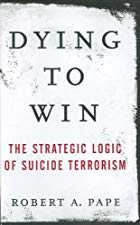 Robert Pape, a professor of political science at the University of Chicago, has analyzed suicide bombings internationally since the 1980s. In Dying to Win he demonstrates that the earliest case of modern suicide terrorism was carried out by mixtures of Islamists, Christians and Socialists without any particular allegiance to religion in Lebanon. In Sri Lanka many were Buddhists. It is not restricted to any particular religion. The cause was in every case political and national. Religion might help some muster a Dutch courage to carry out those missions, but it might just as often restrain many others from surrendering their lives through such an act. Pape’s latest discussion (co-authored) of Chechen suicide bombings in the New York Times adds to this case. An easier-to-read form of this article can be read on InformationClearingHouse.info.
Robert Pape, a professor of political science at the University of Chicago, has analyzed suicide bombings internationally since the 1980s. In Dying to Win he demonstrates that the earliest case of modern suicide terrorism was carried out by mixtures of Islamists, Christians and Socialists without any particular allegiance to religion in Lebanon. In Sri Lanka many were Buddhists. It is not restricted to any particular religion. The cause was in every case political and national. Religion might help some muster a Dutch courage to carry out those missions, but it might just as often restrain many others from surrendering their lives through such an act. Pape’s latest discussion (co-authored) of Chechen suicide bombings in the New York Times adds to this case. An easier-to-read form of this article can be read on InformationClearingHouse.info.
Dr Jim hits the nail on the head whenever he trashes Richard Dawkins’ too-often “pretty pathetic” [Link //drjimsthinkingshop.com/about/ and blog is no longer active… Neil, 23rd Sept, 2015] treatment of religion. I love a lot of how Dawkins handles religion, but as Dr Jim has put it, he can also show himself up as not really understanding “the humanity” (too busy focussed on “the stupidity of it”). Ditto for Sam Harris. Discussed something like this once before.
Simplistic discussions like these do not contribute to the most constructive way to remove this threat.
If you enjoyed this post, please consider donating to Vridar. Thanks!
